

Digital History. Printable Version Labor conflict was never more contentious or violent in the United States than during the late 19th and early 20th centuries, when bloody confrontations wracked the railroad, steel, and mining industries.

During the early 1880s, there were about 500 strikes a year involving about 150,000 workers. By the 1890, the number had climbed to a thousand a year involving 700,000 workers a year, and by the early 1900s, the number of strikes had climbed to 4,000 annually. Some 500 times government sent in militias or federal troops to put down labor strikes. While most labor clashes took place in the mines and mills of the east and Midwest, bloody incidents involving private police forces, state militias, and federal troops also took place on the New Orleans and San Francisco waterfronts and in the mining districts of Colorado and Idaho. During the late 19th and early 20th centuries, labor struggles were more acute in the United States than in many European countries. The Way to a Fair Deal by Jeff Madrick.
The Moral Consequences of Economic Growth by Benjamin M.
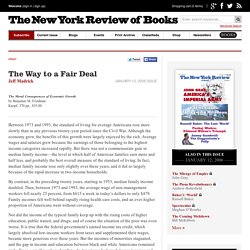
Friedman Knopf, 570 pp., $35.00 Between 1973 and 1993, the standard of living for average Americans rose more slowly than in any previous twenty-year period since the Civil War. Although the economy grew, the benefits of this growth were largely enjoyed by the rich. How Americans Lost Trust in Our Greatest Institutions - Ron Fournier and Sophie Quinton. It's not just Washington.
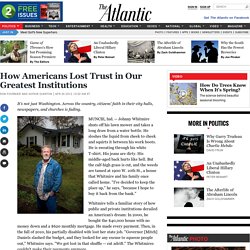
Across the country, citizens' faith in their city halls, newspapers, and churches is fading. MUNCIE, Ind. -- Johnny Whitmire shuts off his lawn mower and takes a long draw from a water bottle. He sloshes the liquid from cheek to cheek and squirts it between his work boots. He is sweating through his white T-shirt. His jeans are dirty. Whitmire tells a familiar story of how public and private institutions derailed an American's dream: In 2000, he bought the $40,000 house with no money down and a $620 monthly mortgage. They applied for a trial loan-modification through an Obama administration program, and when it was granted, their monthly bill fell to $473.87.
A year later, City Hall sent him salt for his wounds: a $300 citation for tall grass at 1900 W. 10th St. Whitmire is an angry man. When Labor Day Meant Something. Industrialization - American Labor. Anarchists & Capitalists by Russell Baker. Emma Goldman: Revolution as a Way of Life by Vivian Gornick Yale University Press, 151 pp., $25.00.
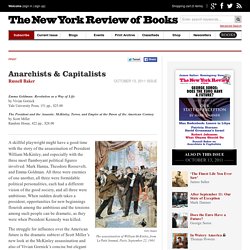
How Robots & Algorithms Are Taking Over by Sue Halpern. The Glass Cage: Automation and Us by Nicholas Carr Norton, 276 pp., $26.95.
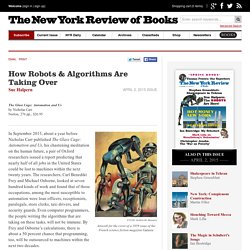
The Wage That Meant Middle Class. 5 Fascinating Comments by Chinese Readers About Apple and Foxconn — The Atlantic. Chinese observers see the manufacturing labor landscape pretty much the way American businesspeople do, which is to say, cynically.
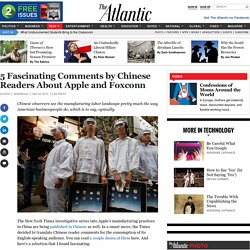
The New York Times investigative series into Apple's manufacturing practices in China are being published in Chinese as well. In a smart move, the Times decided to translate Chinese reader comments for the consumption of its English-speaking audience. China's Uneven Labor Revolution — The Atlantic. Factory conditions in the People's Republic may be improving -- but service workers are getting left behind.
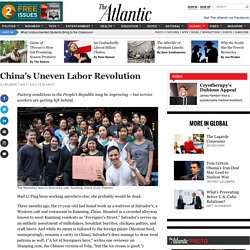
'All Labor Has Dignity': Martin Luther King, Jr.'s Fight for Economic Justice — The Atlantic. Beacon Press While researching at the Martin Luther King Center in Atlanta in 1992, Washington University professor Michael Honey found an inconspicuous folder marked "King's Labor Speeches.
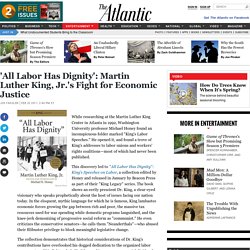
" He opened it, and found a trove of King's addresses to labor unions and workers' rights coalitions—most of which had never been published. This discovery led to "All Labor Has Dignity": King's Speeches on Labor, a collection edited by Honey and released in January by Beacon Press as part of their "King Legacy" series. The book shows an eerily prescient Dr. King, a clear-eyed visionary who speaks prophetically about the host of issues facing our nation today. The collection demonstrates that historical considerations of Dr.
How do these speeches collected here help us reevaluate King's legacy? The book contains 15 different documents from 1957 to 1968, and they all present a somewhat different side of King that most people don't know about. 'Indispensable': Why the Middle Class Needs Unions Now More Than Ever — The Atlantic. Converting a Union Skeptic — The Atlantic. Audra Rondeau wasn't a fan of labor groups—then home-care workers in her state organized, and she gave them a second chance.
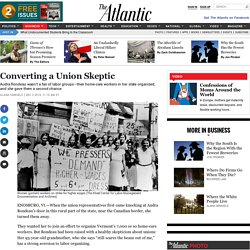
ENOSBURG, Vt. —When the union representatives first came knocking at Audra Rondeau’s door in this rural part of the state, near the Canadian border, she turned them away. They wanted her to join an effort to organize Vermont’s 7,000 or so home-care workers. But Rondeau had been raised with a healthy skepticism about unions: Her 93-year-old grandmother, who she says “still scares the beans out of me,” has a strong aversion to labor organizing. Profitable Caterpillar Pushes Workers for Concessions. Instituto de Educacion Popular del Sur de California. Historias Destacadas. Longshore Workers’ Coalition.